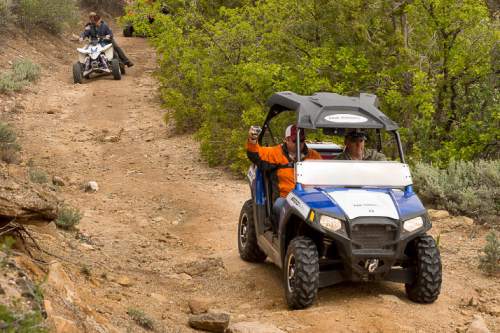This is an archived article that was published on sltrib.com in 2015, and information in the article may be outdated. It is provided only for personal research purposes and may not be reprinted.
Sometimes you have to be careful whom you invite to your party.
As he was organizing an ATV ride into Recapture Canyon last year, Phil Lyman allegedly used social media to promote participation in the protest. Lyman even changed the date to a Saturday so more people could come ride in defiance of the Bureau of Land Management's policies restricting motorized access.
Among those who showed up in Blanding were dour militiamen, some fresh off an armed standoff with federal officers who had been rounding up Cliven Bundy's trespassing cattle from public land outside Bunkerville, Nev.
Now the San Juan County commissioner appears to be wishing the gun-toting, anti-federal activists had stayed in Nevada.
As Lyman's trial opens this week in Salt Lake City, his lawyers are trying to keep federal prosecutors from mentioning firearms and militias when they present their case to a jury. Defense attorneys argue such terms are misleading, confusing and prejudicial.
"Nor do they have anything to do with whether or not the defendants illegally rode ATVs on closed government land," attorney Jared Stubbs wrote. "Mention of guns and militias paint a picture of a violent and confrontational protest ... [and] imply that part of the alleged unlawful acts of the defendants were an armed conflict with the government."
On Tuesday, U.S. District Judge Robert Shelby seated 12 jurors who will spend the next two days hearing the government's case against Lyman and three other San Juan County men. They are charged with conspiracy and driving in an area closed to motorized use.
The BLM closed parts of the canyon in 2007 after unauthorized trail construction was found to have damaged several archaeological sites.
Lyman contends the closure was illegal and the BLM has continued to drag its feet in processing the county's application for a right of way through the popular canyon a few miles east of Blanding.
The canyon has become a flashpoint in wide-ranging tensions between rural Westerners and the federal agencies that manage the lands surrounding their communities.
On May 10 last year, Lyman led a rally in a Blanding park where armed militiamen mingled with locals and spoke loudly against what they see as the injustice of federal land management.
After the rally, at least 50 riders drove into the canyon as mounted sheriff's deputies kept watch.
Federal land managers had no visible presence in the canyon, although BLM district manager Lance Porter had warned Lyman in an April 28 letter that the "BLM will seek all appropriate civil and criminal penalties against anyone who participates in the proposed ride."
Undercover officers in the canyon documented the ride and observers' photographs and videos were subpoenaed.
None of the riders was cited, but a few months later federal prosecutors filed charges against Lyman, blogger Monte Wells, Shane Marian and Franklin Trent Holliday. Charges against a fifth man were quickly dropped.
The fact that many riders displayed weapons reflects on "the intent of any defendant," argued Assistant U.S. Attorney Jared Bennett in documents countering the defense motion.
Bennett's response singles out Wells, who rode into the canyon with a pistol strapped to his thigh.
Prosecutors say their key task at trial is proving the riders "knowingly" violated the law and the presence of firearms is fair evidence.
"Despite knowing the illegality of his actions and that law enforcement may be there, Mr. Wells chose to wear a gun," Bennett wrote. " Any person who decides to wear a gun under such circumstances is clearly intending to act willfully. Also, his decision to wear a gun undermines his assertion that he was a neutral journalist reporting the news."
Lyman was armed only with a camera strapped to his hat. There is no evidence that Marian or Holliday were armed.
Shelby will rule on Lyman's motion Wednesday morning, just before both sides make opening statements.
The defense motion also seeks to prevent the prosecution from describing Lyman's event as an "illegal ride" or referring to any alleged damage to the environment or archaeological resources.
Prosecutors maintain they have no intention of describing any damage riders may have caused to the canyon floor and its hidden troves of artifacts, rock alignments, graves and middens left by the Ancestral Puebloans who lived there 1,000 years ago.
But the illegality of the ride is a settled fact, prosecutors say, and they have every intention of describing it that way.
The question for the jury is whether the ride was a crime, Bennett argued.
"Not every 'illegal' entry by a motorized vehicle into the closed area is a crime. Only those illegal entries that are knowing and willful are criminal acts," he wrote. "Whether defendants' illegal ride was knowing and willful is the central issue in this trial."
If jurors agree, Lyman and the others could face up to one year in jail and $100,000 in fines.
The trial is expected to wrap up Thursday.



